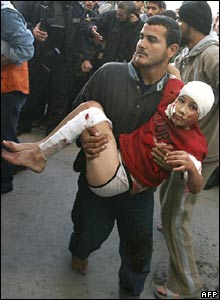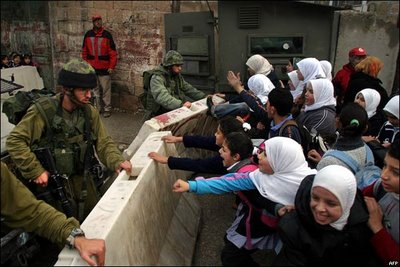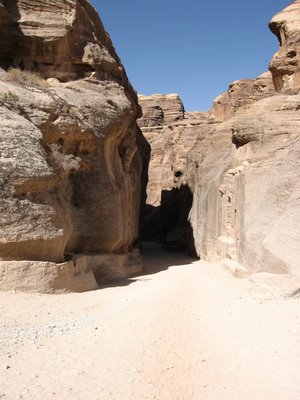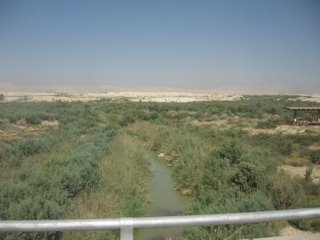
This post was written August 2nd.
Yad Vashem is Israel's Holocaust Museum. It's where, unfortunately, the government brings its foreign dignitaries. Its perched atop Mt Herzl, named for modern Zionism's historical originator. I went there on Sunday. It was impressive and moving. By far one of the most well constructed and presented museums I've ever seen. I can't even fathom the amount of money it took to build it. And as I wandered amongst the teenage soldiers and looked at the moving artifacts of one of the worst moments in human history, I felt overwhelmed. I also felt deeply disturbed by it all. The content was, of course, troubling beyond description - and I felt a similar way in Anne Frank House in Amsterdam a couple of months ago. But also disturbing was the way the Holocaust was historicized into a Zionist narrative.
My friend al-Hawal, who went to Yad Vashem a week before I did explains it very well. I'll let him speak for me...
I go to Yad Vashem alone.
I have to take the bus again. Despite rumours of suicide bombers I'm not really afraid. I take the pedestrian walk through a pine forest to the gate of Yad Vashem. I pass through security. There is no entrance charge.
The main exhibit is overwhelming. It stretches through a long triangular prism which funnels you through a series of exhibits that begin with the rise of Hitler, the Nuremberg laws, the outbreak of war, the occupation of Poland, the establishment of the death camps, the destruction of European Jewry and the Allied liberation of Europe and ends with the Hall of Names - a circular archive that preserves the identities and records of as many of the Jewish victims of the Nazi's genocidal campaign as have been recovered through historical research. It is a tour de force. The recovery of these voices is breathtaking and deeply moving.
It is also a strictly "Jewish interpretation", as stated in the brochure, and perhaps more honestly, it is also in many ways a Zionist interpretation.
The antechamber contains a large triangular screen with a haunting and beautiful reel which moves right to left over the map of Europe. Superimposed on this map are drawings of Jewish culture and life before the war, tiny repeating excerpts of film and audio footage accompanied by the lament of strings reminiscent of Gorecki, echoing into the long hallway of the museum. Because of haunting images such as these, I was transfixed in the Holocaust Authority for some five and a half hours.
The relics of these communities which would be liquidated by the Nazis, the stories and diaries from the ghettos, the artifacts from the crematoria, the last testaments of the imprisoned - they had me struggling between a deep and reverent sense of sadness and a strong objection to the way in which these stories were placed within a subtle but powerfully Zionist historical polemic. For example, the beautiful installation showing Jewish life before the war was also rendered in a cold, colourless pallet of grey tones, the images were two-dimensional-like cut-outs or puppets caught in endlessly repeating cinematic loops. On the opposite end of the long hall, facing this composition is a balcony which opens to the clear blue sky and a "glorious"view of Jerusalem. The implication is that the Galut of Jewish experience in Europe - that is, Diaspora Jewish life is dead and gone, and Jewish national life in the State of Israel is the only living expression of history culminating in the aftermath of the Shoah. Israel is everything. Israel is all that matters now.
But I could just as well see Yad Vashem constructed around the words of Hannah Arendt, in her seminal reading of the trial of Adolf Eichmann in Jerusalem (subtitled "A Report on the Banality of Evil) in which she asks whether a crime against the Jews is not also a crime against all of humanity. Yet the prism of Zionist historiography has instead rendered the Holocaust an internal affair of the Jewish community, one that is used, sadly, to justify the actions of what is really a violent nation state. Does Aushwitz now serve as national justification?As Norman Finkelstein has said, and eloquently so, the 6 million Jews did not die as martyrs for the State of Israel. They were murdered by the Nazis because they were Jews.
The history of Zionism in pre-war Germany is similarly discomforting, as Eichmann himself reported a strong working relationship between the Zionist Organization and the Reich Central Office for emigration. The Nazis wanted a pure Aryan German Reich and the Zionists wanted Jews to colonise Palestine. Chilling, yes, but their goals converged and many emigres brought with them German manufactures whose sale channeled British currency into Germany as it struggled to revive the post post-depression economy. This is one of histories regrettable ironies.
And sadly, despite taking Jews to Palestine at a time when the world was closing its doors to Jewish refugees, including (and perhaps worst of all) Canada and the United States, it wasn't the Zionist Organization which saved hundreds of thousands of Jews by facilitating emigration. In the end, one can extrapolate from the maps in Yad Vashem which show Rommel's steady advance across North Africa that if it had not been for the allied victory at Al- Alemein, the Yishuv would have only served to have collected a great number of European Jews in one spot so that they would most certainly have been easily deported to the death camps - as we saw in the case of Axis-occupied North Africa. In the same way that Adam Czerniakow and the Judenrat are not examined critically by Yad Vashem, as they must be I worry about the footnotes of this Zionist narrative... the way in which the 2.2 million Poles exterminated by the Nazi Generalgouvernemnt are dealt with in the exhibit with this astonishingly reductive footnote:
"...and the Nazis terrorized Polish society."
It makes one feel embarrassed and disassociated with Yad Vashem's narrative discouse. It seems to suggest that our collective experience and resistance to fascism is a matter of individual ethnic or national communities as if we share no universal indignation at the imposition of genocide upon human beings under Nazi rule. In this way, Yad Vashem fails to reflect on some of these realities that might have been articulated by Jewish or non-Jewish humanists with equal eloquence and compassion.
Jerome Kohn writes,
"...one of the underlying reasons for the controversy created by Arendt's study of Eichmann was and remains the failure of many readers, both Jews and non Jews, to make the tremendous mental effort required to transcend the fate of one's own people and see what was pernicious for all humanity."
From my girlfriend Rachel,
"My Polish family were land barons, farm owners in Poland. My grandmother's family is from south of Krakow... Najbor was her maiden name, Czach is my papa's. We were Catholic.
During the Nazi occupation and leading up to it, we sympathised with the plight of the Jews and the Roma... and as the situation in Poland deteriorated we hid them on our land.. in huts and sheds on the farm.
I distinctly remember the story of my great uncle being beaten with a cane by a Nazi soldier for what we did. We also lost our land...
I was told this story by my bobcha in 1993. A young 11 year old me. This story forever changed my own sense of my family and who I am. In the years that followed I have tried to maintain this sense of inclusive histories, even as such narratives are accused of being nothing more than base comparisons of suffering. Instead, the idea of a "Holocaust" which stands separate from the multitude of other victims of Nazi race and political ideology, separates us and discourages our collective sense, as humans, of suffering and injustice."
And so I ask you if these stories and interpretations of collective resistance, despite race or nation, do not also deserve a place in the canons of official Holocaust memory? Are they not also authoritative? Does Zionism so strongly oppose these values that it must, in turn, silence them?
Despite all of this, the exhibits of Yad Vashem were powerful and impressive. The sheer depth of codification, preservation and contextualization of the genocide does indeed stand in clear defiance of Hitler's goal of liquidating European Jewry. I sat for some time in the Hall of Names, rooted to these archives, and the dome plastered with black and white photographs of innocent Jews whose lives were cut short by Nazi fascism and its heinous program of exterminating the Reich's unwanted elements.
As a historian of sorts I feel that what I have said needs to be said, and I await your reactions and criticisms with genuine openness. That I regret that Israel chooses to bring foreign diplomats to Yad Vashem before they participate in meetings, that I felt like I was the only non-Jew visiting Yad Vashem that day, that I had to share small rooms exhibiting violins and manuscripts of music from Warsaw Ghetto orchestras with a troupe of uniformed IDF soldiers being taken through the museum before they go off to bomb Lebanon, that I regret that once again the logic of being determined racially Jewish guarantees you citizenship in Israel but serves to exclude and oppress Palestinians from full participation as humans in a democracy that above all others should have repudiated such race-based laws- that I regret this I will not deny. Even so I will only wish for, and perhaps write about, a better world.
***
Picture
Yad Vashem's beautiful but troubling view of Jerusalem

 About suffering they were never wrong,
About suffering they were never wrong,
































